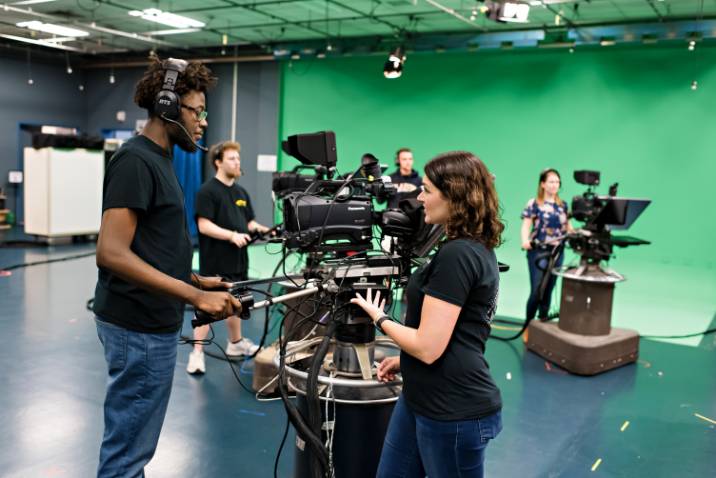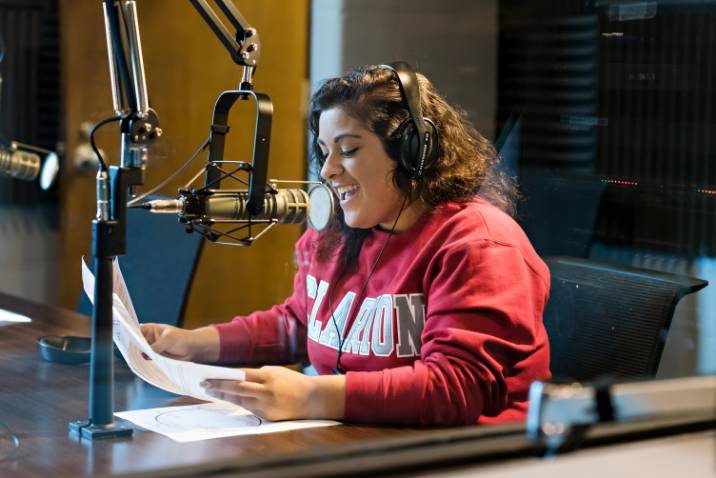
The Department of Communication launches successful graduates by using a mix of communication theory with hands-on learning in the TV studio, radio station, student newspaper and in its state-of-the-art computer lab.
To keep students within industry standards of equipment and software, the communication faculty knew it needed multiple upgrades to every area, explained Dr. Lacey Fulton, assistant professor in the communication department and advisor for Eagle Media Production House, commonly known as Eagle Media Productions.
Dr. Myrna Kuehn, department chair, said the department would save to make some upgrades each year, because they've always known what students need to be successful.
However, over the course of the past couple of years, each media area has received
a major overhaul.
This past summer, upgrades were made to the radio station, 91.7 WCUC, in the control
and talent rooms, including new furniture, paint, carpet, soundproof foam and microphones,
Fulton said. The talent room now has a rectangular table that can accommodate five
on-air talents.
Another marked improvement was the replacement of the radio transmission tower.
"We have a stronger signal over the areas we already covered," Fulton said.
Renovations to the radio station have been taking place for the past two to three years with the implementation of a scheduling system, which is essentially a playlist maker, and an automation system, which gives the station 24/7 programming, allowing WCUC to keep its format. WCUC FM also streams on Tunein.com, an online listening site.
"That's what a lot of professional radio stations are doing," Fulton said of those systems. Fulton said teaching students on the latest software and modern equipment makes them ready for a professional career in radio.
"It has allowed us to run our show more smoothly," said Benjamon Fye, a sophomore communication major who has a freeform radio show with three of his roommates.
In recent years, CU-TV has received some crucial upgrades including a new teleprompter, studio pedestal, cameras upgraded to HD, relocation of the control room, and 21 new JVC cameras which record in high definition with 10 of those rendering in 4K; in other words, some are recording images better than HD.
"We're trying to future-proof with our cameras," Fulton said.
Having new cameras has been beneficial to student Kelly Beveridge, a junior digital media and sport media minor, who is most comfortable behind a camera.
"Having the new equipment has helped me. As a fresh-man, we had cameras that didn't have HD," Beveridge said.
The hope is that there will be a lighting upgrade for next academic year, along with remodeling the sets and keeping up with industry standards regarding the green screen, which has been repainted and must be kept clean.
Kuehn said lighting is the most expensive piece in the TV station with upgrades costing $90,000-$150,000. She said that lighting also requires more than just lamps, as a new compatible board and grid are required to support it.
Senior Taylor Zalus experienced the upgrades to the television studio, a valuable part of his education since he wants to become a technical engineer.
"It's keeping up to the television industry," Zalus said. "It was great for me as a student to see the IT side of things."
As for the Clarion Call, updates were made this past summer. The Call office is now cross-platform, meaning both Mac and Windows-based computers are used together to create the student newspaper, Fulton said. The Clarion Call also has the capability of creating video content with the addition of Nikon cameras with video capabilities.
The communication department now boasts a Media Production Suite with five large-screen monitors which were added this past summer.
A computer lab is where you're likely to find Tyree Mitchell, a senior digital media communication major. Mitchell works heavily in the TV studio on sports productions and sports remotes.
He said he used to be worried about the costs associated with attending college, but because of the equipment experience he's received, he thinks college costs are well worth the experience Clarion's communication majors get working with expensive and modern equipment.
"College is a good investment," Mitchell said. "You use it (the equipment) every single day. I'm going to miss this when I graduate. I'll be ahead of others."
While much emphasis has been placed on renovations, the communication department hasn't forgotten about its roots and supports a Film Camera Club with a fully functional darkroom in Becker Hall.
"It's a faculty-driven initiative," Kuehn said referring to the faculty who frequently stock the dark room. The value is it teaches students the differences in style and form from film cameras to today's digital, Kuehn explained.
Fulton stressed that all of these upgrades have been a team effort between the department's careful budgeting, Tech Fee project funding and the funding from the College of Arts, Education and Sciences interim dean, Dr. Steven Harris.
"It really takes a village," Fulton said.
"It's not fallen on deaf ears," Kuehn said of the administration, which has been supportive of their efforts.
A fund also has been established through the Clarion University Foundation, Inc., for the communication upgrade effort.
Learning how to operate equipment and software related to their craft gives communication majors a unique opportunity to hone skills and gain valuable experience before they graduate. Whether these graduates are working in television or radio broadcasting, journalism, public relations, advertising, social media, web design, photography, videography or somewhere within the entertainment industry, they all learned the basics at Clarion.
And the good news is students can get involved in student-run media from the time they are freshmen, which is what attracted graduates Mike Miller ('92) and Larry Richert ('81) to Clarion in the first place.
"You got into the radio or TV stations and started to contribute right away," said Miller, who now serves as head football coach at Westminster College. "I thought that was important."
Miller said as a freshman he was able to have access to radio and television equipment and help cover Golden Eagles sporting events. "I think that's a real game changer," Miller said.
Kuehn said knowing how to operate equipment makes Clarion's students "capable and resourceful," and she's received many reports of Clarion graduates making good first impressions while interviewing for jobs because they already know how to use and, sometimes even fix, the equipment.
Richert, who has been a KDKA-TV and radio broadcaster in Pittsburgh since 1988, says he considered going to a bigger school but quickly realized he'd get experience right away at Clarion – something he wouldn't have had at a bigger school.
"You didn't have to wait to be an upperclassman to participate," Richert said.
The experience pays off for CU students.
"During my time at CU as a comm major, I was very active in campus media," said Ron Sylvester ('85), owner of RS TV in Hollywood. "I was first attracted to the TV studio and worked on almost every show we produced. By my senior year, I was station manager and sales manager and executive produced and directed several of the shows on the schedule, including University Square, the first college-produced soap opera in the country. I also was involved in WCUC as a newscaster and very much enjoyed learning about radio. My classes and course work was simply something I did in between my TV work."
"Communication majors tend to be well-rounded students who have the top skills employers are seeking, including public speaking skills, group work and creative thinking," Kuehn said.
"My work in production at the TV studio clearly put me head and shoulders above any other graduate when looking for a job," Sylvester said. "I left college with a very professional demo reel, full of great stuff that impressed potential employers."
In addition to basic employable skills, communication majors become adept impromptu speakers and use their curiosity to their advantage.
Kim Lemon ('78) was a graduate of the speech communication and theatre major before speech communication merged with communication several years ago. She's an anchor for WGAL News 8 in Lancaster.
"The biggest thing I learned there was to sort of get out of my comfort zone," Lemon said.Lemon said because you report about anything, "you know a little bit about everything. You have to be a curious person."
Lemon's hope is that curiosity will make today's communication majors try things as students that put them outside of their comfort zones and have positive effects on their communication skills, whether it be through a theatre production or by joining the debate team.
Richert would like today's communication majors to understand the great responsibility that comes with using today's technologies and still getting one's point across.
"It's about creating an effective message," Richert said.
